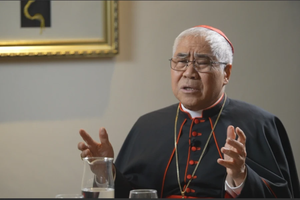Pope Francis: A Friend of the Jewish People
The Holy Father, who died April 21 on Easter Monday, was recalled as an agent of peace in the war-torn Middle East and beyond.

JERUSALEM — Jews around the world remembered Pope Francis as a friend to the Jewish people, a leader who strongly supported Catholic-Jewish relations and roundly condemned antisemitism.
While some felt the Pope was more critical of Israel than he was of Hamas and other Palestinian terror groups, they appreciated his frequent calls for peace and the return of all the hostages held by Hamas since its Oct. 7, 2023, massacre.
Rabbi Noam Marans, director of interreligious affairs at the American Jewish Committee (AJC), recalled the Pontiff’s “exemplary relationship” with the Jewish community of Argentina, where he began his priestly ministry and rose to the position of cardinal.
Like his predecessors Pope St. John Paul II and Pope Benedict XVI, once he became pope, “Francis early on in his tenure strongly affirmed positive Catholic-Jewish relations as an integral part of the post-Vatican II Church,” Marans said in a statement. Marans credited Francis’ “pilgrimages” to the state of Israel in 2014, the Great Synagogue in Rome in 2016 and his visit to the Auschwitz death camp in 2016 as “substantive visuals of the new era in the Church’s understanding of Jews, Judaism, and the State of Israel.”
Just as important, “Pope Francis also repeatedly condemned antisemitism and characterized it as both a sin against God and unchristian.”
When the Pope criticized what the AJC called Israel’s “defensive fight for survival” against Hamas in Gaza — criticism that resulted in “significant Jewish disappointments with this and other matters” — these differences of opinion between the Jewish and Catholic leadership “were navigated in the spirit of six decades of the post-Nostra Aetate relationship.”
Chief Rabbi Pinchas Goldschmidt, president of the Conference of European Rabbis (CER), remembered Francis’ “unwavering dedication to promoting peace and goodwill worldwide and his efforts to strengthen Catholic-Jewish relations,” including their face-to-face meeting at the commemoration of the 50th anniversary of Nostra Aetate, “the 1965 Declaration of the Second Vatican Council that profoundly transformed interfaith dialogue.”
In Israel, where Francis’ legacy is more complicated, President Isaac Herzog offered his condolences to Christians around the globe and in Israel “on the loss of their great spiritual father, His Holiness Pope Francis.”
In a statement, Herzog called him “a man of deep faith and boundless compassion” who championed the weak and the poor. On Jewish issues, “he rightly saw great importance in fostering strong ties with the Jewish world and in advancing interfaith dialogue as a path toward greater understanding and mutual respect,” Herzog said.
However, these ties became increasingly strained after Oct. 7, when a new book written by the Pope urged the international community to investigate whether Israel’s actions in Gaza constitute genocide. The book, Hope Never Disappoints: Pilgrims Toward a Better World, was published on Nov. 19 in Italy, Spain and Latin America.
“What is happening in Gaza has the characteristics of a genocide. We should investigate carefully to assess whether this fits into the technical definition [of genocide] formulated by international jurists and organizations,” the Pope wrote.
At Christmastime, Jews around the world were also upset to see a photo of the Pope gazing at a Palestinian artistic rendering of Baby Jesus wrapped in a keffiyeh. In an attempt to deny the Jewish roots of present-day Israel, many Palestinians and their supporters falsely claim that Jesus was a Palestinian, despite the fact that Jesus and his parents were Jews from Judea. Historical Palestine did not exist at the time.
On Easter Day, Francis spoke in his urbi et orbi blessing of “the terrible conflict” in Gaza that “continues to cause death and destruction and to create a dramatic and deplorable humanitarian situation. I appeal once again,” he said, “for an immediate ceasefire in the Gaza Strip, for the release of the hostages … and for access to humanitarian aid.” At the same time, he said the “growing climate of antisemitism throughout the world is worrisome.”
Rabbi David Rosen, who served as AJC’s international director of interreligious affairs for 23 years and received a papal knighthood in 2005, noted that most Jews and Catholics view the Hamas-Israel war from very different perspectives.
“For us, there is a clear connection between the reactions to Oct. 7 and Israel’s legitimate right to self-defense and antisemitism around the world. Francis didn’t see it like that. For him, they were two separate things. He felt that all violence is bad,” which is why he continuously called for an immediate ceasefire.
“While he did not deny Israel the right of self-defense,” Rosen added, “he felt that Israel has gone overboard.”
On a personal level, Rosen said, Francis felt “a strong personal connection” with the tiny beleaguered Christian community in Gaza, which he spoke to every day by phone, even during his recent hospitalization. “Their suffering really touched him. He articulated his identification with the people there.”
At the Vatican, the Holy Father met with the families of the hostages held by Hamas, but he had a special place in his heart for the people of Gaza, Rosen said.
Despite Francis’ mixed feelings about the Gaza war, the Jewish community will always be grateful for his unshakeable stance on antisemitism.
“He said, you cannot be a true Christian and an antisemite. He really did condemn and hate antisemitism,” said Rosen. “That is an important legacy.”
- Keywords:
- jewish people

















